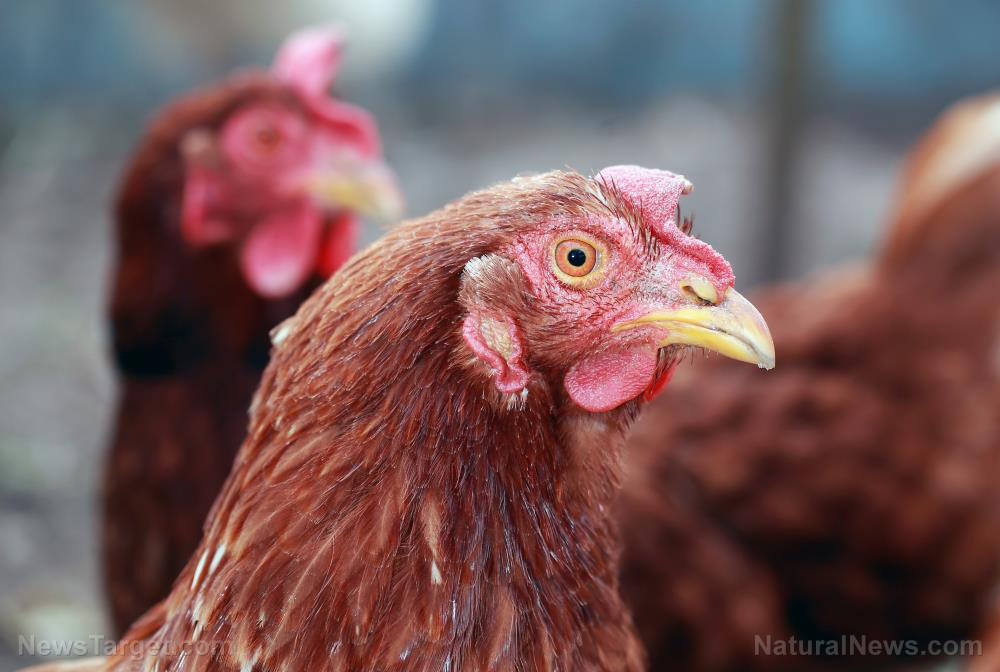Homesteading 101: Using chickens to help manage your compost

(Natural News) Homesteaders who till the soil and raise chickens at the same time have the opportunity to create a flourishing ecosystem. By turning chicken poop into organic compost, homesteaders may naturally improve the yield of their food garden crops.
Chickens tend to poop at the same place they sleep. Put down some sand in the areas that they use as a toilet.
After they do their business, collect the poop with a kitty litter scoop. A metal scoop makes it easier to scrape the chicken manure from the ground.
Homesteaders with access to oysters may use the shells as natural scoops. Sterilize them first by baking them.
After every use, set the oyster shell scoops down on a nearby board. The chickens may peck on them to get calcium, thereby reducing their urge to eat their eggs to get enough nutrients.
Meanwhile, store the collected poop in a bucket. Stir it before pouring the mixture out, or use a scoop to draw measured amounts out.
However, do not apply the chicken poop to root vegetables like beets, carrots, and potatoes. Fresh manure may contain disease-causing microbes.
Further, chicken manure is rich in nitrogen. Too much of anything is harmful. Thus, instead of pouring the mixture directly on the plants, apply the organic fertilizer near the roots of the vegetables or fruit trees. (Related: 5 Garden hacks to boost production and reduce loss.)
How to get chickens to help turn over compost and food waste
Take advantage of the scratching habits of chickens. Place several blocks on the ground before laying a screen on top of them. Make sure the chickens can step or hop onto it.
Sponsored solution from the Health Ranger Store: The Big Berkey water filter removes almost 100% of all contaminants using only the power of gravity (no electricity needed, works completely off-grid). Widely consider the ultimate "survival" water filter, the Big Berkey is made of stainless steel and has been laboratory verified for high-efficiency removal of heavy metals by CWC Labs, with tests personally conducted by Mike Adams. Explore more here.
Next, spread compost and food waste across the flat surface. When the chickens scratch on the screen, they will force compost and poop through the mesh. The resulting mixture of compost, food waste, and chicken manure produces excellent soil for growing vegetables and other food plants.
This practice will put the household’s food waste to much better use. Composting food waste not only nourishes plants and poultry that will feed people, it will also reduce food-related pollution and wastage.
Composted food is disgusting. As it decomposes, it draws insects and worms. It also needs regular turning. And while making compost is simple, it still takes up time and energy.
Chickens will perform this chore for homesteaders. They will eat the food waste, snack on any bugs, and turn over the compost.
Get the most out of your chickens and compost
Set up the composting screen near the coop. The chickens will find it sooner rather than later, and they will do the job of turning over compost for the homesteader.
Chickens are omnivores. They eat bugs, dairy, and meat as readily as they do plants and poultry feed. They will get rid of the things that don’t belong in the compost pile.
As they go through the food waste in search of more edibles, their digging and scratching activities will turn over the compost. They, therefore, provide the aeration required by the rotting materials.
Compost only develops an unpleasant stench if it isn’t turned over. When it gets the aeration it needs, it smells much better. Raising chickens in the city to perform the duty of aerating compost may make compost piles more palatable to the neighbors.
Further, chickens need dirt in their stomachs for their health. They get this necessary grit by eating worms, which in turn eat dirt.
Compost piles attract worms as well as bugs. The chickens will get their fill of worms while leaving enough to help break down compost.
Raising chickens is a good first step to your journey to sustainable living. Homesteading.news has more tips on how to raise your own poultry animals.
Sources include:

